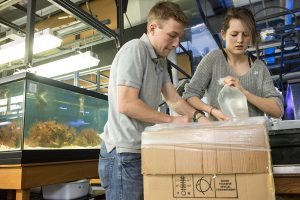Central-Bred Jellyfish Head to Omaha’s Henry Doorly Zoo
Everything You Wanted to Know About Jellyfish but Were Afraid to Ask.

Students in the Marine Biology program at Central Campus prepare their jellyfish for a trip to Omaha, where they will be displayed at the Henry Doorly Zoo.
That could have been the title for a presentation delivered this morning by visiting experts from the Henry Doorly Zoo in Omaha to the Marine Biology and Aquarium Science classes at Central Campus.
Mitch Carl (Curator of Fishes) and Andy Hinrichs (Aquarist) drove over to enlighten some DMPS students with aqua-biologic aspirations of their own. Their fee? Jellyfish – homegrown ones!
The jellyfish were bred in a lab at Central Campus and are ready to be surplused to a major public aquarium. Their source is unconventional to say the least, according to Kirk Embree who teaches Marine Sciences at Central.
“When I go to conferences and talk about teenagers in our program culturing jellies in high school people are astounded,” Embree said. “This is the sort of thing that makes our graduates so attractive to colleges and facilities in these fields when they leave here.”
Hinrichs and Carl were certainly impressed by their tour of the lab on the 3rd floor at Central.
“I only wish I’d had a resource like this place available to me when I was growing up,” Hinrichs told Embree’s students.
“Jellies are tricky to breed and grow,” Embree commented.
And after listening to Hinrichs lecture on protandrous hermaphroditic jellies and their life cycles, you start to get an idea what Embree means. But the program at Central is stocked with enough “Moon” jellies now that they have some to spare. Offering them to the zoo in Omaha is one way Embree and his students reciprocate to public aquariums that have assisted them with donations of equipment and expertise.
If Hinrichs stuck pretty much to the science of it all in his remarks, Carl’s travelogue about expeditions to the Caribbean to coincide with coral spawning season was a livelier discussion that included full moons, larvae nets fashioned from lingerie and an eccentric millionaire in Curacao who got the bends from scuba diving and bought himself a submarine so he could continue collecting rare fish.
Then it was time to bag up the jellies and get them on their way to their new home in Omaha. That task was handled by four seniors in the program with oceanic ambitions. Emilie Skartvedt (Lincoln) fished the jellies out of their tank and relayed them to Erin Overton (North), Jeff Darus (Lincoln) and Jack Heimbach (Roosevelt).
What about stings?
“That’s not a problem with these jellies,” Skartvedt said. “After a long time I might start to feel some tingles but that would be about it.”
“In the wild they need to sting as a means of catching prey. But these in captivity don’t need to sting to collect food,” added Heimbach. Oh, so these jellies are sort of domesticated.
Skartvedt plans to study oceanography in college, possibly at TCU. Heimbach has been accepted to one of the nation’s leading programs in aquarium science, at the University of New England. Darus is headed in the same direction but clear across the country at Oregon Coast Community College. Overton will be at Iowa State next year in the aquatic science and fisheries program.
Maybe one of them will someday unlock the secret of The Immortal Jelly. According to Hinrichs it’s a concept that’s part legend, part biology. See, a “Medusa” jelly dies and falls to the ocean floor where its cells regenerate and reprise the whole protandrous hermaphroditic asexual dance thing before eventually growing back into an adult Medusa. Think reincarnation in the context of the movie Groundhog Day.
It’s complicated but rest assured the young scientists at Central Campus get it.
Next month they’ll hang out the “Gone Fishin’” sign on the lab at Central for the department’s annual trip to Florida where, a brief weather report on the whiteboard in Embree’s room noted, the high and low temps on February 7th were expected to be 82 and 73, respectively.
No snow days are anticipated.




